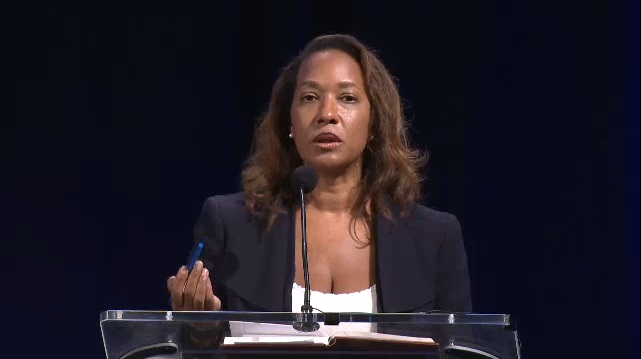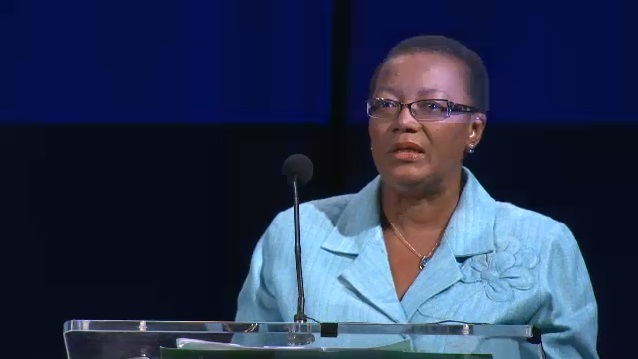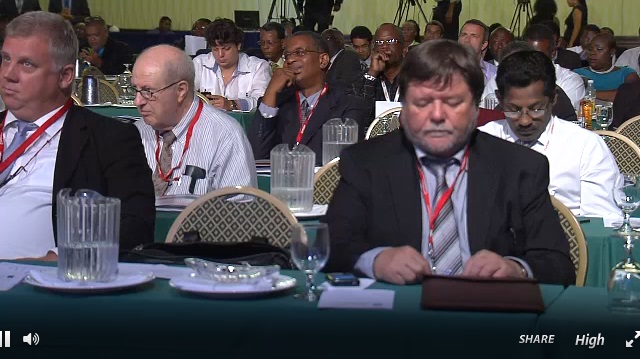
Overshadowed by the landing of a European Space Agency probe on a 4km-wide comet, 67P, 6-billion kilometers from earth after a 10 year journey through space, the Caribbean Export Development Agency (Caribbean Export), wrapped up a two-day meeting (colloquium) to address challenges to the export sector and propose solutions for a region struggling to find its roots and place in the world.
All the news those two days, November 11 and 12, was about the spectacular mission that required scientific precision equivalent to landing a pin on a pock of a golf ball from 200 miles. It meant therefore that not many would have heard the Barbados Minister of Foreign Trade, senator Maxine McLean, invoke, if only in passing, Jamaican national hero Marcus Garvey’s method of raising capital for his Black Star Line Steam Ship Company, as an example of alternative ways to mobilize funding for major economic ventures in the Caribbean Community (CARICOM) region.
Whether as prophet or visionary, the ghost of Garvey the international black advocate, continues to hover over contemporary affairs decades after his death in England in 1940.
If retired professor, Robert Hill, while delivering the Elsa Goveia Memorial Lecture at the Cave Hill Barbados campus of the University of the West Indies a week earlier, had set out to explode the myths and magic that followers had built around Garvey, McLean didn’t sound deluded when she told the colloquium in her wrap up speech that she still had a Black Star Line share certificate from the 1920s that had belonged to her great grand father—a living document that reflected a Caribbean effort at self-determination.
The experts in international trade, energy, global shipping and logistics, finance, and intellectual property rights, all of whom Caribbean Export assembled in its third colloquium in as many years, had convened under the theme “Building Economic Resilience in the Caribbean”.
It was fortuitous the convergence of the ideas: Garvey and modernism versus mysticism, with Garvey the modernist at variance with his followers seeking a messiah or mythic agent; the European Union’s space programme and its long precise journey, targeting and achieving its objective, and Caribbean Export, a more than decade old agency that sprang out of a EU-funded project to help the CARICOM countries, the Dominican Republic and Suriname to prepare for the loss of their banana and sugar market preferences in Europe.

For some the assembly’s themes and topics were like déjà vu. They’ve already participated in similar events and heard the grand ideas presented, plans designed but never implemented. The Agency’s own executive director, Pamela Coke-Hamilton, expressed her caution at such an outcome resulting in reports acquiring dust on shelves.
The discussion on innovation may have been full of gusto but the average Caribbean business person, verbally ridiculed in Jamaica’s case by then democratic socialist prime minister, Michael Manley, in the 1970s, as “half-educated haberdashers” are probably now MBA haberdashers and inn keepers, averse to new ideas and risk.
In the same breath that a tourism leader will advocate for marketing the Caribbean as a unique destination comprising may distinct parts, he or she may chose the Beach Boys’ music over The Wailers for the advertising soundtrack on the grounds that the former are more familiar to North American ears. At the same time, North American car manufacturers and other industry giants will use reggae to sell their ware in their home markets.
You can watch world sprint record holder Usain Bolt on American TV selling German track shoes in his Jamaican accent but Caribbean goods and services for the most part are communicated in top notch American by Americans. Back home in the Caribbean, people squabble about protecting the intellectual property that had been spurned until others had seen value in it.
So we come back to Garvey and the world view that defines the self in the universe of peoples and things and ideas. What is the vision of self and the physical world that the Caribbean wants? Coke-Hamilton spoke about something she defined as “constructive deviance” in relation to innovation and the meeting summary had calls to include teachers and the education system in changing attitudes to innovation but one had a feeling that everything was abstract.

Exactly what is the vision that the Caribbean Diaspora would be encouraged to fund, for example? Certainly it’s not money for the public sector, especially considering the example of the results of funding agency grants and loans, nor could it be for expanding the retailing of imported goods.
It has to be more than picking up the scraps from bigger ships transiting the Panama Canal, or pushing locals off beach front land or simple secondary level agricultural exports.
The Rosetta mission that landed the craft on the comet is a 20 year affair that has cost eur1.4 billion.
“We see significant returns on investment from government putting funds into scientific research. It directly causes the economy to grow. One study showed it caused the economy to grow by 20% three years later,” said Dr Sarah Main of the Campaign for Science and Engineering (Case), discussing the value of such investment of time and resources in the Rosetta project.
Caribbean Export is executing the Regional Private Sector Development Programme (RPSDP) funded by the EU under the 10th European Development Fund (EDF). Soon people in Europe will be asking questions about the value of continuing to finance overseas development, and the answer ‘providing support for lost markets’ will be as far off target as if the mission to 67P had ended up on mars. The dream time is over.


About Mark Lee
Mark Lee has been a long-time journalist writing, editing and producing in print, radio television and new media.










